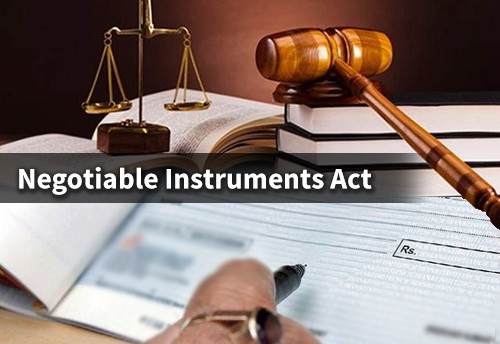Cheques are widely used to complete a number of transactions including re-payment of loans, payment of remuneration, etc., Since, paying money through cheques secures a proof of transfer. It is one of the three negotiable instruments and thus is governed by the provisions of the Negotiable Instruments Act, 1881. Cheque Dishonour means when the cheque is bounced and the amount is not transferred to the bank account of the beneficiary, this happens when the bank declines to grant the cheque’s sum to the beneficiary or the payee. Dishonor of Cheque is an offense under section 138 of the Negotiable Instruments Act, 1881. There are several reasons for which a cheque is dishonored.
Why is a cheque dishonored?
There are various reasons for cheque dishonor such as; If all the details in a cheque are not filled adequately, The details of the beneficiary’s account are not enclosed properly The signature of the payer is not included The amount details mismatch Inclusion of an incorrect date The funds in the account are insufficient Dishonor of cheque constitutes an offense under section 138 of the Negotiable Instruments Act, 1881 only if the cheque is dishonored because of the insufficiency of funds in the account of the payer.
What happens in case of cheque bounce?
When a cheque gets dishonored, the payee bank issues a “ Cheque Return Memo” to the banker of the payer. The cheque return memo specifies the reason for non-payment. The payee bank then transfers the cheque and the memo to the payee who can resubmit the cheque within three months if the payee feels there is a probability that the cheque will be honored. If the payer still fails to make the payment, the payee has the right to prosecute the issuer of the cheque in a court of law. The payee has no right to prosecute the payer if the cheque is issued as a gift or towards a loan for unlawful purposes.
Legal action under the Negotiable Instruments Act, 1881

Section 138 of the Negotiable Instruments Act,1881 makes Dishonor of Cheque an offense if the cheque was dishonored owing to the lack of funds or it exceeds the amount arranged to be paid from that account by an arrangement made with the bank. The payer shall be deemed to have committed an offense in the said cases. Punishment or charges under cheque bounce case in India includes imprisonment not exceeding two years or with a fine which may be extended by the court to twice the amount of cheque or with both imprisonment and fine. The issuer of the cheque has the right of getting a fair chance to prevent the initiation of legal proceedings. A notice in writing needs to be sent to the payer by the payee, and if the cheque issuer fails to make a fresh payment within 30 days of receiving the said notice, the payee is entitled to file a criminal complaint under section 138 of the Negotiable Instruments Act, 1881. Several essentials need to be fulfilled in order to invoke section 138 of the Negotiable Instruments Act, 1881.
Essential of action under section 138 of the Negotiable Instruments Act, 1881
The payer draws the cheque The payer himself must have drawn the cheque against an account that the payer maintains. The cheque is dishonored The cheque drawn must be returned by the bank and the money shall not be transferred to the payee’s bank account to initiate legal action under the said section. Disbursement in the clearance of debtor obligation The cheque must be issued by the issuer against an account maintained by him with the bank to transfer money in the account of the payee in order to discharge a certain loan or some other liability that is legally enforceable. If the cheque is issued for a gift, charity, or giving a loan to the payee, essentially if the cheque is not issued to release a liability, there lies no legal action under section 138 of the Negotiable Instruments Act, 1881. Dishonor due to insufficient balance It is necessary that the cheque must be dishonored because of the insufficient funds in the account of the payer. There are two situations wherein the fund is said to be insufficient. The first is when the amount of money in the account is less and the second is when the amount to be paid has surpassed the amount that can be paid as per the agreement with the bank. Payer fails to make payment after receiving the notice If the payer could not initiate payment within 30 days of receiving the notice from the payee, then he is said to have committed the offense of dishonor of cheque.
Procedure for filing cheque bounce case under section 138
After all the essentials mentioned above are fulfilled, the complaint shall be submitted to the Concerned Magistrate having jurisdiction within 30 days from the day on which the period for payment of money by the issuer of the cheque expires. The complainant himself shall sign the Complaint or a duly authorized Power of Attorney holder and the day complaint is being presented before the Magistrate, it should be presented with an affidavit of the complainant and all required documents must be annexed with the complaint. The Magistrate after scrutinizing all the documents and the complaint will issue summons to the Respondent if the commission of an offense is made out and the trial will commence.
Can Dishonor of Cheque be resolved by alternative dispute resolution (ADR)?
Alternative dispute resolutions viz. arbitration, conciliation, and mediation generally deal with disputes of civil nature and not criminal offenses. Dishonor of cheque is a criminal offense but essentially it is of civil nature, and in case the issue can be privately settled, there is no need whatsoever to approach the Magistrate’s Court under section 138 of the Negotiable Instruments Act, 1881, and the dispute can be resolved through alternative dispute resolution. All the offenses under the Negotiable Instruments Act, 1881 are compoundable offenses as per section 147 of the act, which means there can be a settlement between the parties. The data clearly demonstrates the huge number of pending cases of dishonor of cheque in India, as per the 213th report of the Law Commission of India over 38 lakh cases of dishonor of cheque were pending out of which 7.6 lakh cases were pending in the criminal courts in Delhi at the Magistrate level alone. Since these cases are overflowing it becomes integral to find other credible alternatives like alternative dispute resolutions to resolve the cases faster.
How can you resolve a cheque bounce case within 60 days by way of Online Dispute Resolution?
Online dispute resolution is a mechanism that provides services related to alternative dispute resolution through online platforms which makes the process even more seamless and fast. Resolving disputes through online dispute resolution is indeed a very preferable choice. You can resolve your cheque bounce case within 60 days by way of Online Dispute Resolution. WeVaad is an online dispute resolution institution that provides alternate dispute resolution mechanisms viz; arbitration, mediation, and conciliation through online means. We have a proficient panel of WeVaad experts who acts as arbitrators/mediators/conciliators and aid in faster dispute resolution. Please check our offering on “Online Dispute Resolution” to file your cheque bounce case for a faster and more economical resolution.

